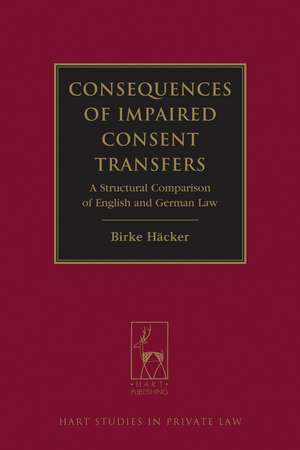Consequences of Impaired Consent Transfers: A Structural Comparison of English and German Law: Hart Studies in Private Law
Autor Birke Häckeren Limba Engleză Hardback – 24 noi 2013
Din seria Hart Studies in Private Law
- 28%
 Preț: 498.73 lei
Preț: 498.73 lei - 30%
 Preț: 1129.41 lei
Preț: 1129.41 lei - 30%
 Preț: 509.60 lei
Preț: 509.60 lei - 22%
 Preț: 238.22 lei
Preț: 238.22 lei -
 Preț: 217.53 lei
Preț: 217.53 lei - 28%
 Preț: 374.46 lei
Preț: 374.46 lei - 22%
 Preț: 237.66 lei
Preț: 237.66 lei - 28%
 Preț: 437.06 lei
Preț: 437.06 lei - 30%
 Preț: 601.04 lei
Preț: 601.04 lei - 28%
 Preț: 436.15 lei
Preț: 436.15 lei - 30%
 Preț: 602.11 lei
Preț: 602.11 lei - 18%
 Preț: 302.52 lei
Preț: 302.52 lei - 22%
 Preț: 258.42 lei
Preț: 258.42 lei - 22%
 Preț: 225.06 lei
Preț: 225.06 lei - 30%
 Preț: 569.60 lei
Preț: 569.60 lei - 30%
 Preț: 600.06 lei
Preț: 600.06 lei - 30%
 Preț: 598.45 lei
Preț: 598.45 lei - 18%
 Preț: 322.23 lei
Preț: 322.23 lei - 28%
 Preț: 498.16 lei
Preț: 498.16 lei - 18%
 Preț: 320.53 lei
Preț: 320.53 lei - 30%
 Preț: 601.29 lei
Preț: 601.29 lei - 30%
 Preț: 541.54 lei
Preț: 541.54 lei - 30%
 Preț: 570.99 lei
Preț: 570.99 lei - 22%
 Preț: 261.64 lei
Preț: 261.64 lei - 30%
 Preț: 540.38 lei
Preț: 540.38 lei - 30%
 Preț: 838.22 lei
Preț: 838.22 lei - 30%
 Preț: 541.38 lei
Preț: 541.38 lei - 18%
 Preț: 357.83 lei
Preț: 357.83 lei - 22%
 Preț: 232.54 lei
Preț: 232.54 lei - 30%
 Preț: 774.86 lei
Preț: 774.86 lei - 22%
 Preț: 269.76 lei
Preț: 269.76 lei - 30%
 Preț: 719.33 lei
Preț: 719.33 lei - 30%
 Preț: 774.28 lei
Preț: 774.28 lei - 18%
 Preț: 322.05 lei
Preț: 322.05 lei - 22%
 Preț: 776.24 lei
Preț: 776.24 lei - 27%
 Preț: 409.73 lei
Preț: 409.73 lei - 30%
 Preț: 569.37 lei
Preț: 569.37 lei - 30%
 Preț: 514.01 lei
Preț: 514.01 lei
Preț: 544.05 lei
Preț vechi: 776.17 lei
-30% Nou
Puncte Express: 816
Preț estimativ în valută:
104.10€ • 108.69$ • 86.16£
104.10€ • 108.69$ • 86.16£
Carte tipărită la comandă
Livrare economică 04-18 aprilie
Preluare comenzi: 021 569.72.76
Specificații
ISBN-13: 9781849465656
ISBN-10: 1849465657
Pagini: 408
Dimensiuni: 156 x 234 x 15 mm
Greutate: 0.75 kg
Editura: Bloomsbury Publishing
Colecția Hart Publishing
Seria Hart Studies in Private Law
Locul publicării:London, United Kingdom
ISBN-10: 1849465657
Pagini: 408
Dimensiuni: 156 x 234 x 15 mm
Greutate: 0.75 kg
Editura: Bloomsbury Publishing
Colecția Hart Publishing
Seria Hart Studies in Private Law
Locul publicării:London, United Kingdom
Caracteristici
This book is a re-publication of a work published by Mohr Siebeck in Germany.The book is an exploration of the rules and principles governing impaired consent transfers of movable property and their reversal in two- and three-party situations.The author, an expert in the field, compares and contrasts English and German law.A fascinating study for anyone interested in consent transfers.
Notă biografică
Birke Häcker is Professor of Comparative Law at the University of Oxford, Director of the Institute of European and Comparative Law, and a Professorial Fellow of Brasenose College, Oxford.
Cuprins
Part One: Setting the SceneChapter I: Introduction A. Aim of Project and Methodology B. Scope of Inquiry C. Structure of Book and Main ThesesChapter II: Basic Principles Compared and ContrastedA. Introduction B. Basic Principles of Contract Law C. Basic Principles of the Law Relating to Unjust(ified) Enrichment D. Basic Principles of Property Law E. No ConclusionPart Two: Two-Party SituationsChapter III: German Law and the Consequences of Abstraction A. Introduction B. Relationship between Contract and Conveyance C. Contract Void, but Conveyance Valid D. Invalidity of both Contract and Conveyance E. Competing Wrongs-Based ClaimsF. Summary Chapter IV: Personal and Proprietary Restitution under English LawA. Introduction B. Operation of the Unjust Factor Regime C. Relationship between Personal Claims to Restitutionfor Unjust Enrichment and (Vested) Property Rights D. Availability and Form of Proprietary Restitution E. Competing Wrongs-Based ClaimsF. Summary Chapter V: Comparative Observations on Two-Party CasesA. Introduction B. Scope of RecoveryC. Separation and Abstraction in English LawD. Reflections on 'Proprietary Restitution' E. Summary Part Three: Three-Party SituationsChapter VI: The Position of Third Party PurchasersA. Introduction B. Extensive Proprietary Protection of Third Parties in German LawC. The Relatively Weak Position of Third Parties in English LawD. Comparative Observations on the Position of Third Party Purchasers E. Summary Chapter VII: The English Third Party Rights Bar to Rescission A. Introduction B. Background C. The Third Party Rights Bar in OperationD. Abolition of the Third Party Rights Bar E. Summary Chapter VIII: Claiming Substitute Assets from the Transferee (and Third Parties) A. Introduction B. Tracing and Disgorgement Damages in English LawC. Limited Personal Rights to Substitutes under German LawD. Comparative Observations on Claims to Substitute AssetsE. Summary Part Four: Summing UpChapter IX: Conclusion
Descriere
In this structural comparison between English and German law, Birke Häcker explores the rules and principles governing impaired consent transfers of movable property and their reversal in two- and three-party situations.
